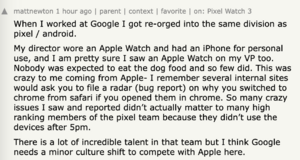Blog/2024-08-13/Google v Apple

I saw a Hacker News comment today about how Google Engineers never used their products and it struck me how I didn't ever believe anything but. When the comment was posted I thought to myself "Well, obviously not, they can afford iPhones and Apple Watches" but implicit in that is that the Android devices are not as good. That seems obvious to most people looking from the outside but it's very clear that Google cannot really execute on high-quality hardware products.
Their best hardware is probably the Google Home series, the little pod version of which is an Alexa / HomePod clone that's actually quite good (I have 4 of them in my home). The rest of their stuff varies in quality, but none of it is really good.
The comment reads:
When I worked at Google I got re-orged into the same division as pixel / android. My director wore an Apple Watch and had an iPhone for personal use, and I am pretty sure I saw an Apple Watch on my VP too. Nobody was expected to eat the dog food and so few did. This was crazy to me coming from Apple- I remember several internal sites would ask you to file a radar (bug report) on why you switched to chrome from safari if you opened them in chrome. So many crazy issues I saw and reported didn’t actually matter to many high ranking members of the pixel team because they didn’t use the devices after 5pm.
There is a lot of incredible talent in that team but I think Google needs a minor culture shift to compete with Apple here.
Overall, my impression of Google isn't that it's a company that's obsessed with creating a great product. It's primarily a place to go get a job that pays really well and where you don't work as hard as at the other FAANGs.
Apple on the other hand has the reputation of obsession and it shows in strange ways. My favourite Apple feature is the fact that HDR video allows brighter-than-white visuals by darkening the rest of the screen and focusing on the video. This has a cool effect, but the most interesting aspect of this, to me is that it must have taken quite a lot of coordination to do this. The driver guys working with the screen guys working with the display guys etc. to make sure it worked. So their org has a way to deliver on things like this that require cross-team functionality. Very cool.
The particular anecdote in the HN thread reminds me of one that a friend of mine told me, which I thought was sort of informative. I'm paraphrasing, but it went like this: (my friend worked at Apple for many years, around the time PA Semi was acquired to later, and then moved to Google)
Me: So how do you like working at Google?
Friend: Oh it's really cool. They have this thing called a blameless post-mortem. You don't say it's anyone's fault and you kind of identify the problem with the process that led to the bad outcome. It's cool and it's a nice place to work because of things like this.
Me: Oh, I see. When did you encounter this?
Friend: We missed tape-out for some of the chips we were working on and that's really bad because it delays a lot of stuff. After we got everything sorted we had a blameless post-mortem and lots of good lessons were learned.
Me: Oh cool. That's pretty cool. How would they do it at Apple?
Friend: Oh I don't know. We never missed tape-out at Apple.
I thought that was a funny story that contrasted the two teams. Google is renowned for having a great SRE team and having high uptime and this approach they've taken is quite famous. Blameless post-mortems are quite common in the software industry, but apparently must not be common enough in semiconductors for my friend to have encountered this before.
My friend didn't mean to say that Apple has never missed a deadline. He was being earnest and not implying anything. But it does make for a pretty entertaining story.
